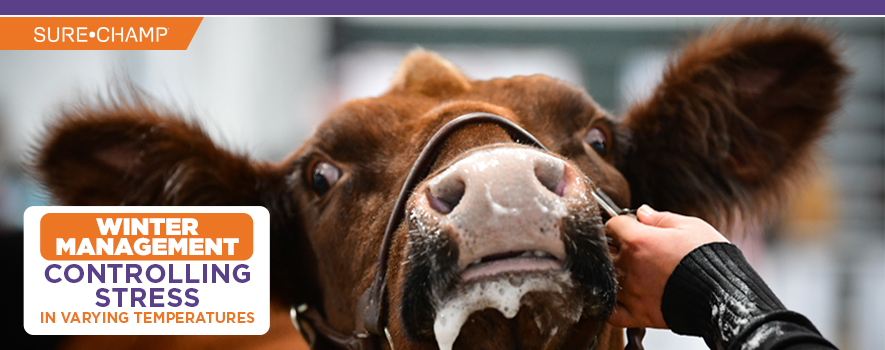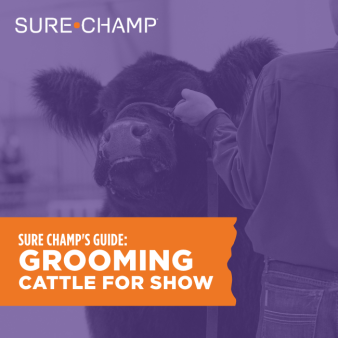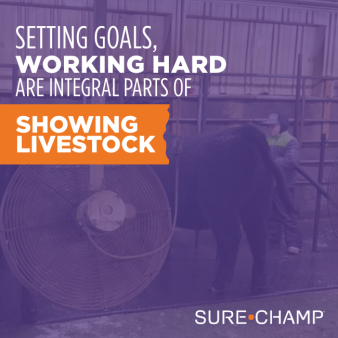
As we move into winter, it is hard to know what the temperatures are going to be like. You might be bundled up tight for morning chores, but by noon are ready to start shedding layers as the sun warms us up. Imagine being a haired up show animal during this same time frame, except they can’t take off any layers to deal with the heat.
There is a certain amount of stress that show cattle, especially, go through during the winter, as they transition from colder outside temps to being moved indoors where it is warmer. However, with some simple management tips, you can keep your show cattle comfortable throughout the winter.
Heat stress might be a term that you only acknowledge during the summer months; however, heat stress occurs whenever the temperatures are hotter than 70 degrees Fahrenheit. Some of your show barns might be right at that 70-degree mark, and for sure the barns at major livestock shows are hotter than that, especially with the humidity from wash racks. Add in the transition from extreme cold to the warm barns, and that has the potential to add stress to your cattle.
Another primary cause of heat stress in the winter months is the digestive system working overtime to break down feed. Exhibitors often feed a higher-energy diet to meet nutrient requirements in the colder months. Therefore, the rumen works extra hard to break down the feed, creating extra internal heat in the animal.
“When we lead these haired-up show cattle in to a hot, humid barn with little air movement from the cool tie-outs, their body temperatures increase significantly,” said Blaine Rodgers, Show Livestock Manager for BioZyme® Inc. “Livestock start to experience heat stress at 70-degrees, and we know from personal experiences those barns can be hotter than 70. We also need to remember that their rumen is working extra hard to break down their feed, raising their internal temperature even more.”
Besides digestion and extreme Temperature Heat Indexes (THI) created in hot, humid barns, other causes of heat stress at winter shows include extreme temperature shifts when traveling between climates and altitudes and walking long distances from tie-outs into a hot barn. Traveling to a show in a poorly ventilated trailer can also cause unneeded heat stress.
Heat stress can wreak havoc on your show animals’ overall health, causing challenges with their digestive, respiratory, immune and reproductive systems. Livestock will go off feed and water when they are stressed, they start to breath heavily, which can lead to respiratory issues. As well, their immune system is compromised, which could result in additional health challenges.
However, heat stress doesn’t need to stress you out. One way to help your show animals beat heat stress is with products developed by Sure Champ® that support normal body temperature in a safe, fast, and natural way using the Amaferm® advantage. Sure Champ Extreme and Vita Charge® Climate Control Gel are two easy-to-use supplements to make sure your animals stay healthy and help regulate body temperature. Sure Champ Extreme is a pelleted, daily supplement designed to be mixed into or top-dressed onto feed. Vita Charge Climate Control is an oral gel that works as a vasodilator that widens the blood vessels, increasing blood flow and thus cooling the body. It is recommended to be given two-three days prior to traveling to the show, and then daily while at the show when in a warmer, more humid climates.
Amaferm, a key ingredient in all Sure Champ products, is a precision-based prebiotic designed to enhance digestibility by amplifying the nutrient supply within for maximum performance, and it is research-proven to lower body temperature and maintain performance during heat stress. It is also proven to increase water and feed intake while decreasing the body temperature in heat-stressed animals. As Amaferm aids in digestion, that decreases the amount of work the digestive tract has to do, therefore lowering the body temperature caused by digestion.
Other ways to make sure your livestock stay cool include putting up fans in the barn, rinsing animals, and making sure they stay hydrated with plenty of fresh, cool water. Don’t forget to keep your trailer properly ventilated while traveling, and even though it seems cold outside, cattle especially need that ventilation as they will generate body heat in an enclosed trailer while going down the road, just like humans put off body heat when they are in an enclosed area.
Heat stress is real, even in the winter. However, you can give your show cattle the comfort they need and deserve as you #PreptoWin this winter with proper management and the assistance from Sure Champ and Vita Charge products.

